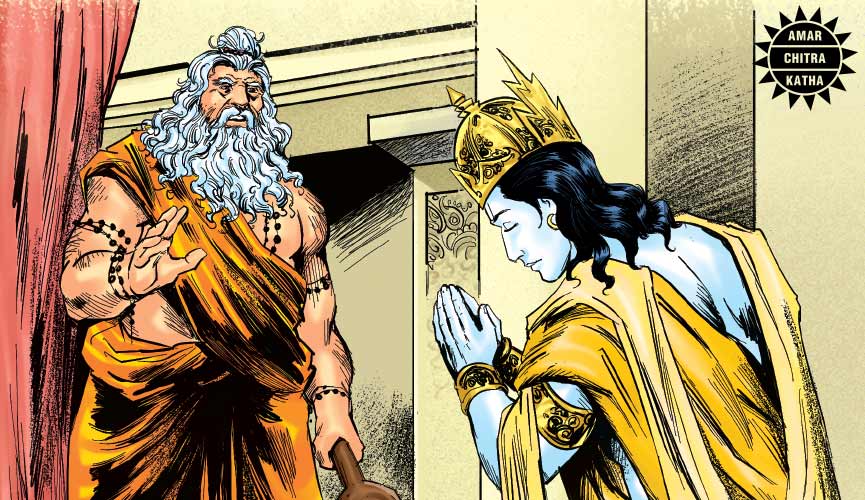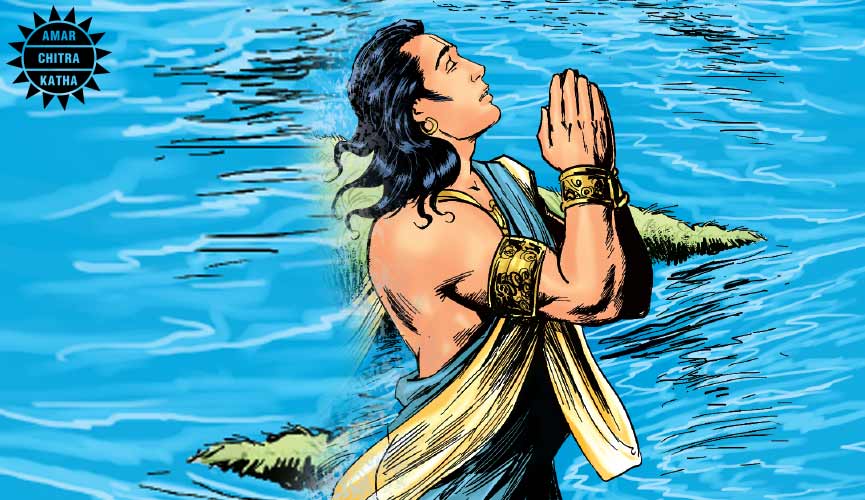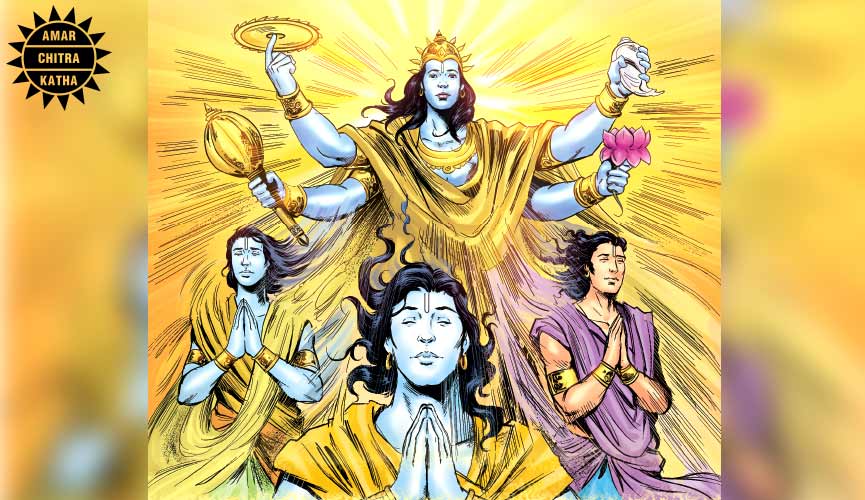By Harini Gopalswami Srinivasan
According to Valmiki’s Ramayana, Sita’s departure into the earth had filled Rama with grief and anger. He threatened to destroy the whole earth if Sita was not returned to him. Brahma pacified him, saying,
“Do not grieve. Remember that you are an incarnation. You will be reunited with the pure and noble Sita in heaven.”

The next morning, Kusha and Lava sang the Uttara Kanda, the last book of the Ramayana, dealing with future events. After the sacrifice was over and all the guests had left, the sorrowful Rama returned to Ayodhya, treasuring Sita in his heart. He did not marry again; a golden image of Sita served as the queen in every sacrifice. Rama performed thousands of Ashwamedha, Vaajapeya, and other sacrifices, giving generous donations. He ruled over his kingdom righteously. The clouds poured forth rain in time, the harvest was good, and the cities were full of happy, well-fed and long-lived people. After a long time, Kausalya, Sumitra and Kaikeyi went to heaven and were happily reunited with Dasharatha. One day, Yuddhajeet, the king of Kekeya, asked Rama’s help in conquering the beautiful territory of the Gandharvas, along the river Sindhu. Rama sent Bharata with his two brave sons Taksha and Pushkala. After conquering the territory, Taksha was established as king of Takshasheela, and Pushkala as king of Pushkalaavati. Similarly, Rama carved out two kingdoms in the Kaarupatha region for Lakshmana’s sons, Angada and Chandraketu.
Ten thousand years passed, with the four brothers always striving to serve the citizens righteously. One day, Death appeared at the palace, in the form of a rishi. He told Rama that he wanted to speak to him in private. If anyone heard or saw their conversation, Rama would have to kill him. Rama agreed, and sent Lakshmana outside. Then the rishi said,
“I am your son, Kaala (time), the destroyer of all. I bring you this message from Brahma: O Vishnu, lord of the universe, you were born on earth in human form to slay Dashagreeva. Your scheduled stay of eleven thousand years in the mortal world is coming to an end. If you wish to return to heaven, the Devas will be happy.”
As Rama smilingly agreed, Rishi Durvasa appeared at the royal gate. He threatened to curse the kingdom and the whole family of Raghu if he was not allowed to see Rama immediately. Hearing those dreadful words, Lakshmana thought,
“If I go to Rama now, only I will be killed; all the others will be saved.”

He fetched Rama, who came hurrying out to see Durvasa. The rishi said he had just completed one thousand years of his tapas and he wanted cooked food. Rama immediately served him food and Durvasa, after eating well, went away praising Rama. Only then did Rama remember the words of Kaala. He was filled with sorrow. Lakshmana spoke to him sweetly,
“This is but the law of time. Keep your promise and do not grieve for me. For the sake of dharma and out of affection for me, punish me without hesitation.”
After consulting his councillors and priests, Rama renounced his brother, saying that renunciation was the same as destroying a person. Lakshmana went to the bank of the river, stood with joined palms, and stopped breathing. Raining flowers on that heroic scion of Raghu, the devas came and took him to heaven.
The grief-stricken Rama decided to place Bharata on the throne and follow Lakshmana at once. But Bharata and all the citizens pleaded with him to take them along. Seeing their devotion, Rama agreed. He lovingly installed his sons Kusha and Lava as the kings of Kosala and Uttara Kosala respectively. Then he sent a messenger to Shatrughna. Shocked at the news, Shatrughna installed his sons, Subahu and Shatrughati, on the thrones of Madhura and Vidisha respectively, and came straight to Ayodhya. The vanaras, bears and rakshasas also arrived in great numbers, eager to follow Rama. Rama asked Vibhishana, Hanuman, Jambavan, Mainda and Dwivida to stay on earth until the end of Kali Yuga. All the other vanaras and bears were to go with him.

The next morning, Vasishta performed all the rites of the final departure. Then, preceded by the priests with the brilliant umbrellas of Agnihotra and Vajpeya, the lustrous, lotus-eyed Rama walked to the Sarayu, praising the Supreme Brahma. He was followed by all the weapons of destruction, and accompanied by Shri, Mahi, the four Vedas, Gayatri, Omkara and Vashatkara, and all his devotees – Bharata and Shatrughna and their wives, noble rishis and rakshasas, and all the citizens of Ayodhya, young and old, even down to the tiniest animals and birds. As they approached the river ford at Goprataara, Brahma and the devas came in their shining chariots to receive Rama and his followers. Flowers rained on them all as they ascended to the heavens and were united with their ancestors. To the delight of the Devas, Rama and his brothers merged into Lord Vishnu.
Read Amar Chitra Katha’s six-volume set of ‘Valmiki’s Ramayana’ on the ACK Comics app or Kindle. Now, also available on Amazon, Flipkart, and other major e-tailers.






